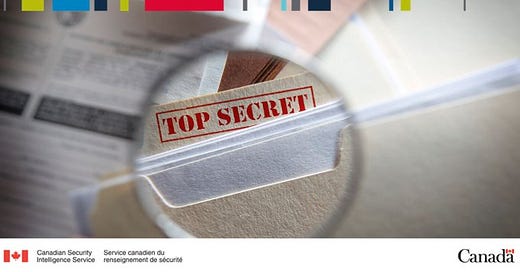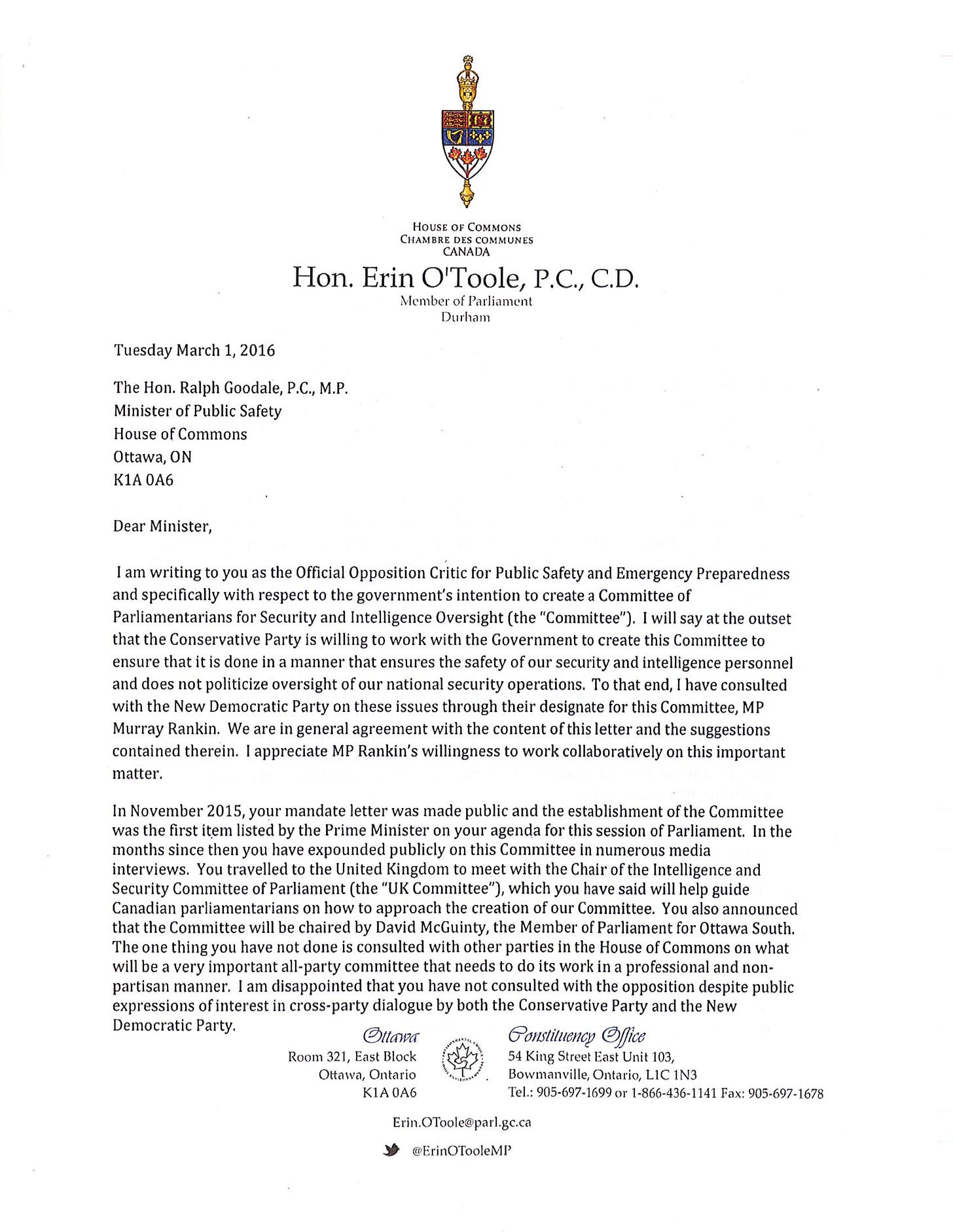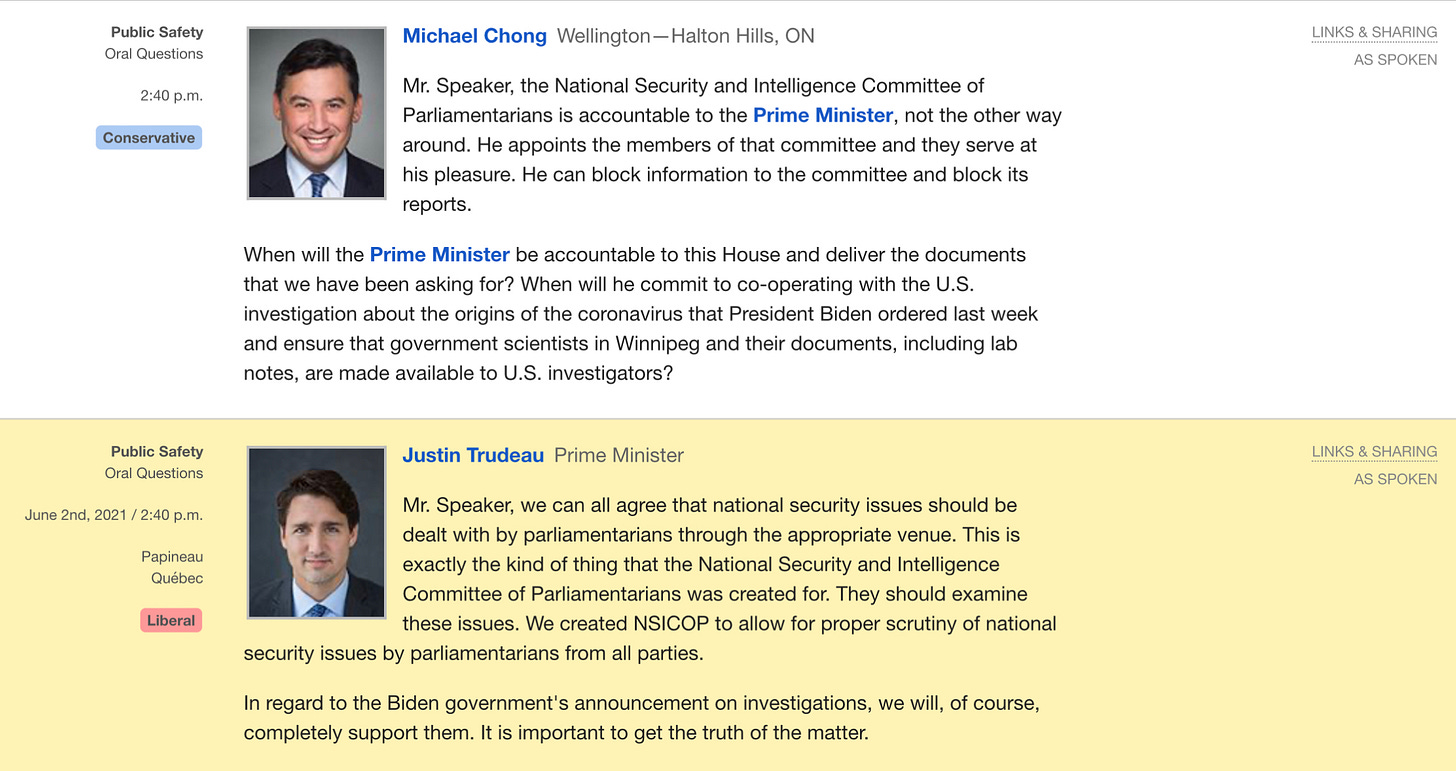Removing Politics From Intelligence Oversight
NSICOP was never intended to be a political shield
The testimony of the Prime Minister’s Chief of Staff at a parliamentary committee today shows how little Members of Parliament (especially Liberal ones) appear to know about origin of the National Security and Intelligence Committee of Parliamentarians (“NSICOP”) and the role it was intended to play in security oversight. The testimony also made it clear that the Prime Minister’s Office (“PMO”) has forgotten the reason why NSICOP was created in the first place. In her opening statement, Ms. Telford suggested that NSICOP was created out of the Prime Minister’s experience watching the Conservative government’s handling of the Afghan detainee document situation. That is simply not the case from a review of the origins of NSICOP and the debate surrounding its creation. In fact, I believe that I was the only MP to raise the Afghan detainee document privilege ruling of Speaker Milliken at the time NSICOP was created.
With all this in mind, it is an important time to remind people about the origins of NSICOP and what its intended role was. It is also a critical time for us to address the long-standing criticism of the way this important oversight committee was set-up. Namely, that NSICOP should report and be accountable to Parliament itself and not to the PMO. This is what the main opposition parties have asked for from the very beginning and recent experience shows needs to happen now more than ever.
First, I want to say how much I appreciate the important work done by the committee and applaud the various Members of Parliament and Senators who have served on NSICOP since its inception. I know that the workload is intense and the issues can be challenging. I would also like to highlight the excellent work that has been done by the founding NSICOP Chair, David McGuinty. While I was initially critical of the way that David was appointed Chair of the committee, I believe that he has been a serious and professional hand on the tiller at a time of rocky seas.
The Origins of NSICOP
NSICOP was not created out of the need to have a special committee handle top secret documents to eliminate the partisanship of the chambers of parliament, nor was it created because of the Prime Minister’s personal experience watching the Conservative government handle the Afghan detainee document affair. I can say that because I was involved in the creation of what became the NSICOP and never heard such a suggestion in 2016 or in the years afterward. The first time I heard that suggestion was today.
The real origin of NSICOP predated the Conservative government and actually came before Justin Trudeau was elected to parliament. The origin of parliamentary oversight of security and intelligence operations stems from the government of Paul Martin and the need to protect the public from potential overreach of national security agencies. Protection of individual rights was at the heart of what became NSICOP and its mandate of oversight was never meant to interfere with the “indisputable privilege” of parliament to have access to documents and the information it needs for our parliamentary democracy to function properly.
“Before us are issues that question the very foundations upon which our parliamentary system is built. In a system of responsible government, the fundamental right of the House of Commons to hold the government to account for its actions is an indisputable privilege and in fact an obligation.”
-Speaker Milliken
In a lovely political irony at the heart of today’s proceeding, I think all Liberal MPs (and PMO officials) should review the speech given by the Chair of the Procedure and House Affairs Committee back in 2016 when she outlined the rationale behind the creation of NSICOP on behalf of the Trudeau government. Then the Government House Leader, Bardish Chagger, made it clear that NSICOP would “scrutinize national security activities, hold the government to account, and ensure that our national security agencies consistently act responsibly”. The focus was on protection of the public. The Government House Leader took pains to also reassure members that while the government was creating NSICOP it was not limiting the ability of parliamentarians to hold the government to account on sensitive matters relating to national security.
“The committee's mandate and powers will be legislated and cannot be altered by the government. The committee will act with full independence from the government in deciding which matters to review, and in reporting its findings and recommendations…
Nothing in the bill would limit members' ability to draw perceived deficiencies in government performance to the attention of Parliament and Canadians, so long as they do not disclose classified information.”
Hon. Bardish Chagger introducing Bill C-22, September 27, 2016
Bill C-22 created NSICOP and empowered it to perform oversight of security and intelligence operations with the stated intention that it would have full independence in its review powers and that the work of the committee would in no way limit the role of opposition parliamentarians. In fact, the Government House Leader’s remarks cited above actually highlighted the ability for MPs who were active participants on NSICOP itself to still hold the government to account on issues that NSICOP had reviewed provided the MP did not reveal any classified information in the performance of the role criticizing the government. Nowhere in her speech introducing the bill was the Afghan detainee document experience raised. Ironically, I raised it in indirectly in my response by citing Speaker Milliken’s rulings on parliamentary privilege issues that could be impacted by the creation of NSICOP.
NSICOP Owes its Origin to the Martin Government
In 2004, the government of Paul Martin government released a working paper on national security entitled Securing an Open Society: Canada’s National Security Policy. The security environment had changed radically in the years following the 2001 9/11 terror attacks and Five Eyes intelligence agencies (including our own) were also beginning to have the technical capability to gather intelligence electronically in unprecedented ways due to the rapid growth of mobile phone and internet usage by Canadians. It was in this environment that the working paper made several recommendations on the evolving threat environment and a specific recommendation for more public oversight of security and intelligence gathering operations through the creation of a “National Security Committee of Parliamentarians”.
Anne McLellan, who was both the Deputy Prime Minister and Minister of Public Safety at the time, tabled a consultation paper on the creation of the National Security Committee of Parliamentarians and began the process of engaging with the other parties in the minority government of the time. She was very clear with respect to the intention of the committee and its specific focus on safeguarding the individual rights of Canadians.
“National security should be reviewed in a non-partisan environment that places both the security of the country and the need for an appropriate balance between security and individual rights ahead of other considerations.”
- Hon. Anne McLellan, House of Commons, March 31, 2004
McLellan did not get the chance to bring this committee forward as the minority Martin government was defeated before the committee was created. In fact, McLellan introduced Bill C-81, An Act to establish the National Security Committee of Parliamentarians, just four days before the government fell in a vote of non-confidence.
While the interest in a National Security Committee of Parliamentarians did not disappear entirely during the Conservative governments of Stephen Harper, the issue certainly went on the back-burner amid both the minority and majority Conservative governments. The concept remained relevant during this period through Liberal private members bills that built on the direction McLellan has spelled out in C-81. First was Bill C-551 from Wayne Easter and later Bill C-622 from Joyce Murray. In all of these various proposals the committee was always intended to be a general oversight body that was primarily focused on safeguarding individual rights alongside the operational effectiveness of our national security operations. There was never a suggestion that parliament should defer sensitive matters to a specialized committee.
NSICOP
The 2015 election victory by Justin Trudeau resurrected the work from the Martin government with respect to security and intelligence oversight. The focus on safeguarding the rights of Canadians was even more prevalent in this incarnation of the security committee of parliamentarians given the political opposition to several of the security measures found in Bill C-51 that was passed in the final years of the Conservative government. Accordingly, Prime Minister Trudeau connected the creation of this oversight committee with the dismantling of several C-51 security measures.1
This focus on balancing the rights of Canadians with effective security operations was clear in the mandate letter for Minister of Public Safety, Ralph Goodale.
In particular, I will expect you to work with your colleagues and through established legislative, regulatory, and Cabinet processes to deliver on your top priorities:
Assist the Leader of the Government in the House of Commons in the creation of a statutory committee of Parliamentarians with special access to classified information to review government departments and agencies with national security responsibilities.
Work to repeal, in collaboration with the Minister of Justice, the problematic elements of Bill C-51 and introduce new legislation that strengthens accountability with respect to national security and better balances collective security with rights and freedoms.
NSICOP was placed as the top priority for Minister Goodale and born out of the express desire to “review” government agencies charged with national security. The focus was again to protect Canadians from the potential overreach by the security agencies of the state.
I remember the origins of NSICOP because I was the Shadow Minister for Public Safety at the start of the Trudeau government and was very supportive of efforts to create this special committee. With the support of our interim leader Rona Ambrose, I told Minister Goodale that Conservatives would support the move to establish the committee and hoped that it could be done in a professional and non-partisan fashion.
I was also fortunate to have a strong friendship with the NDP’s critic, Murray Rankin, who had direct experience on national security matters as a former counsel to the Security and Intelligence Review Commission (SIRC). In fact, Rob Nicholson had told me that the Harper government had retained Murray Rankin for some specialized legal work when he was a lawyer in the private sector and we both felt that Murray might make a suitable chair of the new committee given his experience2.
Unfortunately, Minister Goodale did not engage Murray or I in the process and we were left to read about the appointment of David McGuinty as the Chair of a yet to be created committee ahead of their trip to the United Kingdom to meet with the all-party Intelligence and Security Committee of Parliament. By not engaging with the opposition parties right from the start, Minister Goodale really missed an opportunity to build the committee on an all-party foundation that Prime Minister Paul Martin and Deputy Prime Minister McLellan had intended.
Undeterred, Murray Rankin and I met to discuss what we would like to see in the committee and I wrote Minister Goodale with a list of recommendations on the structure and form of the committee from the viewpoint of a cooperative opposition. We heard nothing from Goodale following the letter, so we wrote him a second letter with additional recommendations on the committee might function alongside other oversight bodies. We finally heard back from the Minister with a perfunctory response and no intention to take up our offer of collaboration. This was the unfortunate tone set for the introduction of Bill C-22, An Act to establish the National Security and Intelligence Committee of Parliamentarians and to make consequential amendments to certain Acts, and the establishment of what became NSICOP.
NSICOP Becomes a Political Shield
The early work of NSICOP seemed to work as intended during the majority Trudeau government. When the Prime Minister’s state visit to India in 2018 generated questions about the actions of the Prime Minister’s National Security Advisor and claims of foreign interference, the government faced difficult questions in both the House of Commons and the Senate. The government did not try and stop the examination of the issue in parliament by claiming it needed to be referred to NSICOP. Eventually, NSICOP did undertake a specific examination of the allegations surrounding the India state visit, but the decision was taken by NSICOP independently following a Senate committee examination of the issue. This was a good start to NSICOP.
Winnipeg Lab Documents
Unfortunately, the politicization of NSICOP began to happen the next time an issue of foreign interference came before the Trudeau government. This time it was a minority Trudeau government facing difficult questions regarding Canada’s National Microbiology Laboratory in Winnipeg. Canada had already been gripped by a year and a half of lockdowns, economic disruption and fear related to the COVID-19 pandemic that had its origins in Wuhan, China. After sensational media stories related to the termination of two scientists at the Winnipeg Lab due to possible ties to the People’s Republic of China (PRC) and information sharing with the Wuhan Institute of Virology, it is understandable that opposition parties were eager to hold the government to account. The Trudeau government realized that NSICOP would serve as a perfect political shield for their minority government and suddenly the rationale behind the creation of NSICOP began to change.
Suddenly, NSICOP was the “appropriate venue” to handle sensitive matters facing the government and the House of Commons and parliamentary committees should not have access to sensitive documents. Ironically, this was pretty much the exact position of the Harper government on the Afghan detainee document issue.
In a minority parliament it was easier for the opposition parties to work together to force the government to release documents according to parliamentary privilege, but Prime Minister Trudeau ignored the Milliken Ruling from the Afghan Detainee situation and released the documents only to NSICOP to give some sense like he was complying with his parliamentary obligations when he was not.
Without rehashing every element of this story, the refusal by the Trudeau government to answer questions and release documents to parliament related to this issue is literally unprecedented in modern Canadian political history. The civil servant head of Public Health Agency of Canada was called to the bar of the House of Commons and formally censured by parliament for the ongoing refusal to comply with direction from the House of Commons. This is something that had not happened since the earliest days of our parliamentary democracy. After throwing this professional civil servant under the bus, the Trudeau government went further and took the Speaker of the House of Commons to court in their attempts to block all attempts to get answers to questions related to the Winnipeg Lab reports. This was another unprecedented move that showed a complete disregard for parliamentary privilege and our constitution. A few weeks later, when the COVID-19 election was called ahead of a summer wave of the pandemic, it was crystal clear that all of this was done to keep the runway clear of foreign objects before the planned electoral take off that summer.
Following the 2021 election, it was clear to me and my Shadow Minister for Foreign Affairs that another minority Trudeau government would be tempted to continue to use NSICOP as a political shield and thereby solidify this as standard practice for NSICOP. This is why I attempted to draw a line in the sand on NSICOP and not name Conservative participants at the start of this parliament. My hope was that we could force a change to the use of NSICOP as a political shield anytime there was a politically hot security issue facing this or a future government. With the looming Huawei decision, increasing foreign interference and a increasingly uncertain geopolitical environment, I had hoped to pause NSICOP until we could reach an agreement on its independence alongside an Afghan detainee document type arrangement for the Winnipeg Lab documents. Ultimately, I ran out of time as Leader of the Opposition and did not get the deal I had hoped to broker.
NSICOP Needs to Report to Parliament
I still believe that we need NSICOP to fulfill its original mission of balancing the effectiveness of our security operations alongside the important duty parliament has to safeguard the individual rights of Canadians. This is only more true each year as we see geopolitical instability, foreign misinformation efforts and interference in our parliamentary democracy.
We need to have NSICOP return to being master of its own destiny and a general oversight body that reports to Parliament. It will be good for restoring faith in our institutions and it will eventually become the norm for all governments regardless of political party. The government is already late beginning the mandated five year review of NSICOP operations, so I hope the review offers a chance to make some changes to get NSICOP sailing back on its proper course.
Note to the Special Rapporteur: Please add this recommendation to your report.
Ironically, Justin Trudeau voted for C-51 in opposition and praised the very preventative arrest powers in the legislation, but would reverse these measures as Prime Minister.
Interestingly, Murray Rankin worked at the same law firm as I was at the time - Heenan Blaikie LLP - and we were elected to Parliament on the same day in 2012 by-elections in Victoria and Durham respectively.








Thank you, Erin. This is a very informative piece. I recall all of these events, without the specific details, and I believe you have most assuredly represented the events factually. I hope the “Special Rapporteur” pays attention and gives significant weight to what you have provided.
great stuff